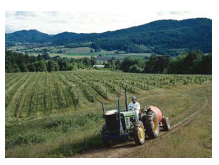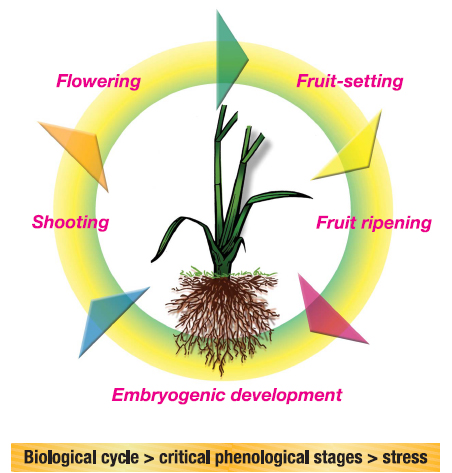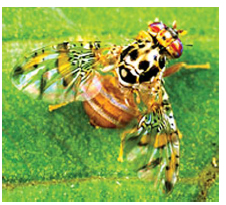Types of vegetal stress
Among them we can highlight those provoked by low temperatures (stress caused by cold or frost) or high temperatures (stress caused by heat stroke). Bellow or above a certain temperature depending on the case, plants suffer severe damage, limiting their functioning. Exposure to cold, paralyses enzymatic activities and induces a decrease in cellular membrane fluidity. Thus, water and nutrient transport through a cellular membranes is hinderes and the plant stops producing fluidity. Thus, water and nutrient transport thought cellular membranes is hindered and the plants stops producing. If the temperature drop is sudden and intense, the plant risks freezing, with the subsequent ice crystal formation inside cells, resulting in strong cellular dehydration.
Stress factors caused by weather conditions

On the contrary, a prolonged exposure to extremely high temperatures damages cells, due to enzyme inactivation and protein denaturalization, inducing an increase in cellular membrane fluidity. As a consequence, solute permeability through cellular membranes is altered. Heat also intensifies plant breathing in relation to photosynthesis, which may provoke growth paralysis. In our Mediterranean climate, hot summers are not only characterized by high temperatures buy they are also accompanied by strong droughts.
The well-known hydric stress can be due to both lack of water (drought) and excess of it (radicular asphyxia). For example, the first one takes place when plant transpiration is greater than water absorption. One of the first manifestations is the loss of cellular turgidity, which causes cell dehydration, somatic closure and reduction of photosynthetic capacity.
Stress factors associated to crop management
Farming practices applied to crop fields to optimize production can damage plants and its environment when conducted inappropriately. For example, the use of pesticides can provoke phytotoxcity problems for the plant caused by phytosanitary treatments.

On the other hand, due to incorrect water management, soil salinisation is becoming one of the greatest problems of the agriculture word-wide.

Saline stress causes toxicity problems for the plant due to the ion concentration present in salts. At the same time, an osmotic effect takes place in plants, preventing them absorbing the water and nutrients they need. The lack of any essential element manifests itself with different physiological and /or morphological symptoms depending on the case. The so-called deficiency stress in not caused by an insufficient presence of a certain element in the soil, but because it is found un a form the plant cannot absorb.
Stress factors caused by phonological stages
Since seed germination until senescence phase, plants experience vegetal development and reproduction, going through a series of stages which conform their biological cycle.
Said development entails a series of physiological and metabolic changes, which allow plants growth and differentiation of its diverse structures, depending on the phenological stage.
Usually critical for the plant and make it specially susceptible to any kind of variation in its optimum development conditions. Stress factors coincide with the embriogenic development, shooting, flowering, fruit-setting and fruit ripening stages, when the plant is more sensitive due to complex inner changes it is suffering. The entry into these different phases is genetically determined and depends on climatic condition.

The common starting signal for each process is a change in endogenous hormone content, followed by changes in the internal distribution of plants metabolites. These sensitive phases also coincide with the critical crop moments to obtain an optimum production.
Stress factors caused by pathogens

Various groups of organisms are damaging to plants. Undoubtedly, insects are one of the most harmful groups, as they can become real plagues for crops. Insects can be classificated depending on the kind of damage they provoke in plants: sap-suckyng insects, shoot chewing insects, ground-digging insects, germ carriers, etc.
Nematodes infestation, on the other hand, has gained importance because of the damage they can cause to plants and thus, they are classified as a separate group. These soil inhabitants attack roots, causing deformation and galls, but their symptoms are very visible in the aerial part of the plant: perishing, yellowing, vigour loss and specially rot.
Also noteworthy are infections caused by fungi, bacteria or viruses. The virulence of these infectious agents is greatly determined by the resistance the plant is able to bear and the plant’s general condition. The symptoms triggered in the plant as a result of an infection by a pathogen organism are very diverse: necrosis and deformations, rotting and exudates or colour alterations, such as foliar mosaic caused by some viruses. Depending on the stage or severity of the infection, there can be important production losses.